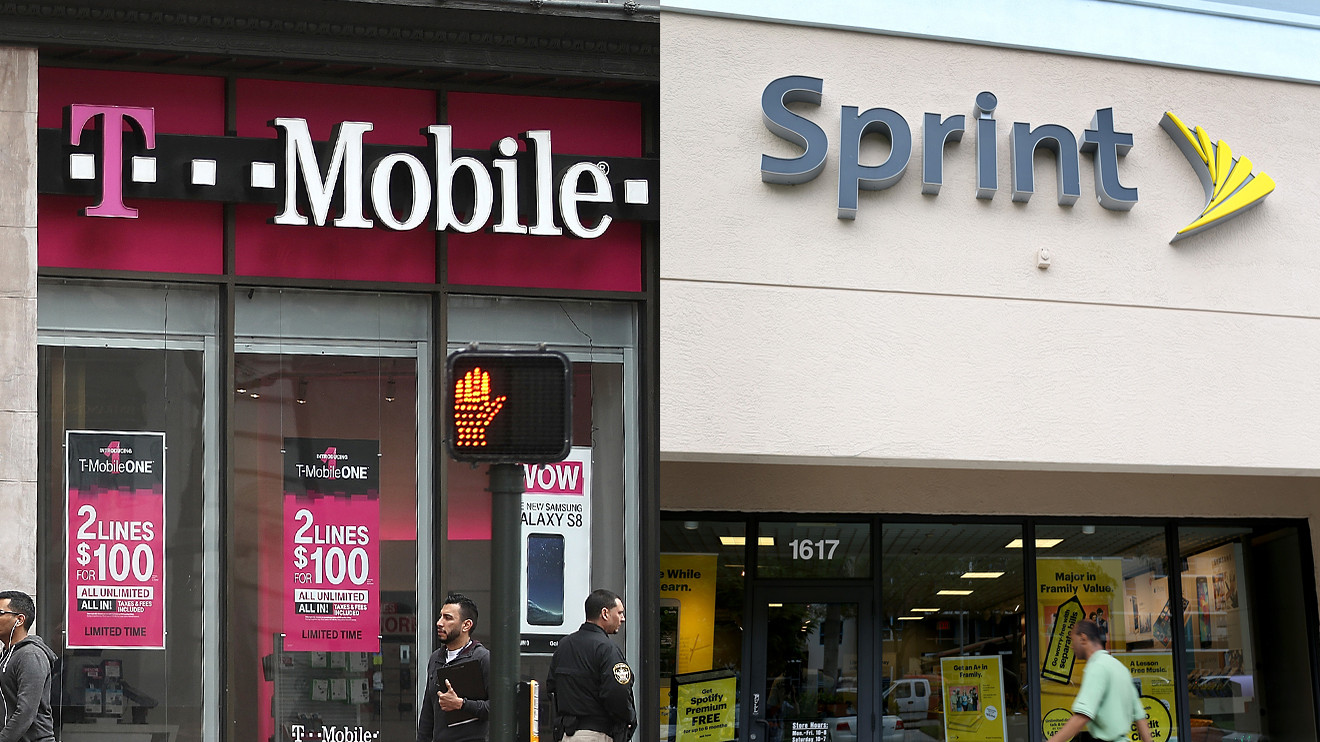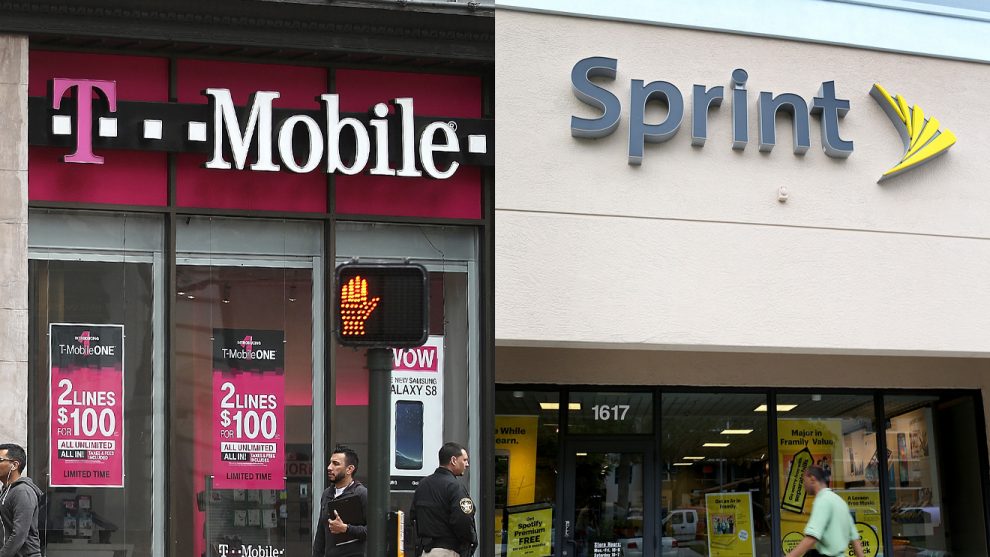
T-Mobile US Inc.’s deal for Sprint Corp. is finally close to becoming reality.
The Department of Justice is expected to approve the telecom deal in the coming days, according to reports, clearing a major hurdle for the carriers and setting the stage for a shake-up of the U.S. wireless industry. T-Mobile TMUS, -2.86% and Sprint S, -7.16% announced their intent to merge last spring, in a deal valued at $26 billion, though the combination requires clearance from regulators.
T-Mobile and Sprint have given numerous reasons for their pending marriage, arguing that it would make the U.S. a more formidable player in the 5G era amid U.S. government concerns about the security of China’s Huawei Technologies Co. Sprint in particular has argued that its network isn’t strong enough for the company to survive on its own once 5G becomes the prevailing wireless standard, but T-Mobile expects that Sprint’s spectrum will prove useful to its growth plans.
Wireless investors are hoping that the two U.S. wireless carriers will have more pricing power in the new industry structure, but it remains to be seen how much leverage a combined T-Mobile and Sprint will have.
Here are five things to know about the pending merger:
With a few conditions…
T-Mobile and Sprint will reportedly have to abide by certain DOJ conditions in order to gain deal approval. Namely, Sprint may be forced to sell about $6 billion in spectrum and also shed its Boost Mobile prepaid phone business to avoid concerns about stifling competition. The company might also need to sell its Virgin Mobile brand.
By stipulating these divestitures, the DOJ would be leaving room for a fourth wireless carrier to emerge in Sprint’s absence to maintain competitive pressure on the remaining players. Dish Network Corp. DISH, -0.20% is thought to be the leading bidder for these assets.
Dish, which tried to scoop up Sprint itself back in 2013, has been buying up spectrum over the past 10 years, making the company the best positioned to become a fourth competitor, according to Larry Downes, a project director at the Georgetown Center for Business and Policy. But Dish may not emerge as the wireless player that the DOJ wants it to be, he told MarketWatch, as the company could decide to simply become a wireless wholesaler, reselling network capacity in areas where retail carriers don’t have their own capacity.
Often in the case of telecommunications divestitures, it can be hard to find buyers for fragmented spectrum, according to Gus Hurwitz, a law professor at the University of Nebraska and academic research director at the International Center for Law & Economics. Reports of heavy interest in Sprint’s spectrum are “a good sign,” he said, indicating that varying types of businesses are interested in this capacity given the potential of 5G.
A complex approval process
The wireless carriers need the blessings of several agencies in order to complete the merger, but winning the DOJ’s support would remove a major hurdle, especially given that the Federal Communications Commission’s chairman has voiced his support of the deal with certain conditions.
One challenge that remains is a lawsuit by several state attorneys general, who argue that the combination is anti-competitive. But making that case would be “an uphill battle” for the states if the two major federal agencies choose not to block the deal, said Hurwitz.
“The courts are going to look at the DOJ and FCC and it’s going to be hard for the state attorneys general to overcome those approvals,” he said.
Downes said that the states would need to “reconsider and refile” their complaint if they choose to continue opposing the deal. Their updated complaint would need to argue that the pending merger would stifle competition even with the federal government’s requested divestitures.
Bad for consumers?
Whether the proposed merger will actually reduce the number of competitive national carriers in the U.S. is probably “what a lot of discussion within the halls of the DOJ has been about,” Hurwitz said.
Both Downes and Hurwitz argue that while Sprint and T-Mobile hope to combine into a single company, the number of U.S. wireless players isn’t actually shrinking. “AT&T and Verizon are the dominant carriers, and while T-Mobile has been effectively competing on the fringes, it isn’t a core strong competitor,” Hurwitz said. He called the combination a “two to three” deal that will create three formidable national carriers, though others say that the merger will reduce the competitive landscape from four to three based on a simple count of the number of players.
Hurwitz said that studies of similar transactions internationally and their impacts on the wireless industry have been mixed. “In the short term, you do tend to see prices going up, but in the long term, we’re not sure if those are transaction-related costs pushing prices up in the short term but that will go down,” he said. Another characteristic of such deals is that companies engaging in these mergers tend to step up their infrastructure spending afterward, “which could be taken as a proxy for improved quality.”
Downes argued that the deal could “put consumers in a more powerful position” because a more robust T-Mobile may be able to better pressure AT&T Inc. T, -0.28% and Verizon Communications Inc. VZ, +0.75%
Desperate times
Sprint’s business wasn’t strong when T-Mobile made its deal offer, but conditions have gotten worse in the year-plus since the merger announcement. Sprint has been playing up its desperate situation in order to curry favor with regulators, most recently admitting that it may have to scale back its national focus if it can’t partner with a more high-tech company like T-Mobile.
Given reports of the possible conditions T-Mobile and Sprint will have to meet to secure deal approval, some analysts wonder if Sprint is still worth the cost.
Asked BTIG’s Walt Piecyk last month: “If T-Mobile was buying Sprint primarily for the 2.5 GHz (ex Clearwire) spectrum and now are willing to release some of the spectrum, why should Sprint shareholders get the same price?” He wonders why T-Mobile isn’t negotiating for an adjustment in deal terms if the company is considering divestitures.
MoffettNathanson analyst Craig Moffett took a similar view but questioned why T-Mobile would want to go forward with this deal at all if Sprint would first have to sell assets. “If the reason T-Mobile wants to do this deal is to fix the industry structure and to get midband spectrum (Sprint’s 2.5 GHz), then a deal like that wouldn’t just make the industry structure worse, it would also, at least based on what has been reported, require divesting some of Sprint’s 2.5 GHz spectrum that is supposedly the raison d’être for the deal in the first place,” he wrote in a recent note to clients.
Don’t miss: ‘A bad deal is worse than no deal at all,’ analyst says of Dish’s reported interest in Sprint assets
A read on the antitrust landscape
Amid several mega-mergers in the media and telecommunications sector, the DOJ’s take on T-Mobile and Sprint could shed light on the agency’s approach to antitrust matters. The DOJ sued to block AT&T’s merger with Time Warner while allowing Walt Disney Co.’s DIS, -1.26% deal for Fox assets sail through.
“AT&T-Time Warner confused antitrust folks and left us all wondering if there is any adult supervision left in antitrust anymore,” Downes said. The DOJ has become “unhinged from antitrust principles” in his view, de-emphasizing “real economic analysis” in favor of reasoning that strikes him as political and arbitrary.









